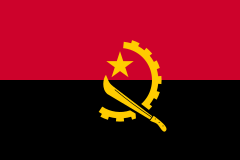Zukuma (music genre)
| Zukuma | |
|---|---|
 | |
| Stylistic origins | Zouk, Kuduro, Kizomba, Kwassa, Compas, Amapiano |
| Cultural origins | |
| Typical instruments | Percussion, Electric drums, Violin, Bass piano, Rhythm and solo, Electric and acoustic guitar Bass, rhythm and solo, traditional Angolan instruments (ndungu, dicanza or reco-reco, hungu, later electronic drums, xylophone, whistle, Shaker, Flute and synthesizers among others. |
Zukuma is a musical genre that mixes various rhythms and African dances, mainly influenced by Kuduro from Angola and Kwassa from the Democratic Republic of Congo.[1]
Meaning of Zukuma[edit]
Zouk, Kuduro, Kizomba, Kompa, Kwassa and Mapiano.[1]
Origin[edit]
Originating in Angola, Zukuma integrates distinctive elements from various African rhythms, such as Zouk, Kuduro, Kizomba, Kompa, Kwassa and Mapiano, to create a unique and engaging sound.[2]

History[edit]
This musical genre was founded on July 1, 2022, by the Angolan singer Sapiyossi, when he had emotional challenges, he transformed negative feelings into positive ones. He created therapeutic music and dance as a form of personal expression and healing.[3]
Productions[edit]
First Instrumental Production - Luanda, Angola (2022-2023): Duration of eight months, completed by "Cássias Produções" on January 14, 2023.
First Musical Production - Brussels, Belgium (2023): Duration of two months. Capture, mix and master (Dada Studios) on March 23 until May 20.
First music video production - Brussels, Belgium (2023): (CF Production) was carried out between May 26 and 28, and the editing lasted seven months, ending in January 2024, going through seven versions.
Later Productions - Brussels, Belgium (September 2023): two instrumentals at (Anderlecht Studios) from Brussels, Belgium, including three other instrumentals.[4]
Zukuma Musical Features[edit]
Zukuma is known for its catchy beats and energetic rhythms, which often combine electronic elements, vibrant percussion and traditional African influences. These beats are designed to make people dance and move.[3]
Melodic Diversity[edit]
The genre embraces a wide melodic diversity, incorporating catchy melodies and harmonies that reflect the richness of African music.[1]
Meaningful Letters[edit]
The lyrics are often fundamentally meaningful, with a therapeutic influence, seeking to express messages about positive emotions and facing social, cultural and political issues; the majority are sung in Portuguese.[2][3][4]
Dance Style[edit]
Vibrant movements and unique choreography align with the energy of the music, incorporating elements of contemporary and traditional African dance.[3]
Cultural and Global Impact[edit]
Zukuma represents cultural diversity and African musical creativity. With the potential to reach global audiences, it contributes to the growing influence of African music.[2]
References[edit]
- ^ a b c "Significado y origen de género musical Zukuma en Angola". El Universal Digital (in Spanish). 2024-02-18.
- ^ a b c Redacción (2024-02-19). "El ritmo emergente que celebra la diversidad musical africana". El Grafico del Sur (in Spanish). Retrieved 2024-02-29.
- ^ a b c d Muanza, Francisco (2024-02-05). "Zukuma: A revolução do novo gênero musical angolano criado pelo cantor Sapiyossi - Hold On Angola". Hold On Angola (in European Portuguese). Retrieved 2024-02-29.
- ^ a b brettwells (2024-02-19). "Zukuma: Musical Genre - A Revolution Created by Singer Sapiyossi". Rolling Hype. Retrieved 2024-02-29.
